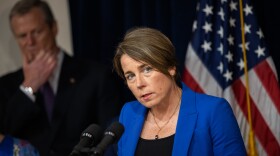If a labor push on Beacon Hill is successful, Massachusetts could become just the second state in the U.S. with a unionized legislative staff. Matt Murphy of the State House News Service explains what aides and staffers are looking for, and how their message is being received.
Matt Murphy, State House News Service: This has been something that has been percolating for several years. And the effort by the Senate staffers is focused around getting cost of living adjustments, better health care, including health care coverage that kicks in on your first day of employment rather than waiting. And they're looking for equity across the board.
One of the big issues we've heard staffers complain about over the years is that because of the way the Senate operates and the way it budgets for staff, a chief of staff or a legislative aide can get paid vastly different sums depending on who they work for. And they are seeking more equity, more clarity and transparency in the way the Senate decides and allocates salaries for staff who they say do a lot of the work on Beacon Hill with regards to legislating and writing new laws.
Carrie Healy, NEPM: And would the legislature itself have to act in order to make this union possible?
Well, that's unclear at this point. And part of why we're seeing Senate leadership be pretty quiet up until this point. Senate President Karen Spilka says she's asked Senate legal counsel to review the Senate staffers union push. They are seeking to be voluntarily recognized by the Senate president's office so that they can begin bargaining. But there is a state law governing what is a public employee for the purpose of collective bargaining. And legislative staffers are not included in that law, which could be a legal hurdle and could require legislative action.
This is certainly something that is difficult for Democrats, particularly pro-union, pro-labor Democrats, some (who) were seen come out and being supportive, but others looking at the legal challenges here and what may be required and keeping some of their feelings closer to the vest.
And that, I presume, is why Massachusetts Senate President Karen Spilka, herself a former labor and employment law mediator, isn't in front of this push on Beacon Hill?
Yes, she's walking a tight line here and she has pointed to the fact that the Senate has tried to improve things. Her office in recent years has hired the National Conference of State Legislatures to do a review of the Senate pay scale and systems in place. They produced a report earlier this year finding some inadequacies, and they're seeking to address that. She's also implemented some cost of living adjustments and tried to make other changes to make the system more transparent and more fair, but clearly not enough. And we've heard from Senate staffers say that they want something that will be in place and protect them after Senate President Spilka is long gone.
In other news, two hearings were canceled last week on Governor Charlie Baker's climate proposals, including plans within the next decade to reduce greenhouse gas emissions. So, those hearings were written into the state's climate roadmap law, along with a July 1st deadline for some of those plans. How unusual was that being canceled and what do we expect to see happen next?
It was fairly unusual to see these canceled, especially with no explanation from the administration as to why. I think one thing we know, is we can expect these to get put back on the books at some point. They are required to hold these hearings and get these plans in place by the summer. And these are critical. This is to put the state on the path toward hitting its legal requirement of becoming a net zero emissions by 2050.
This would set up interim targets to keep Massachusetts on track along the way. And the administration has put together a plan, not all of it celebrated by activists. Some would like to see it be more aggressive, but it is a plan, for decarbonization that relies on things like electrification of vehicles and public bus fleets, wringing carbon emissions out of the building sector and transitioning off fossil fuels like gas. But there are other things that can be done, and that's the point of these hearings.
The Senate last week proposed a sweeping climate bill that would do even more around consumer electric vehicle rebates and try and get gas burning cars off the roads. But this is something to watch for, definitely in the next few weeks, I'm sure these will be rescheduled. And this is one of the main, most pressing issues facing policy makers on Beacon Hill right now.







